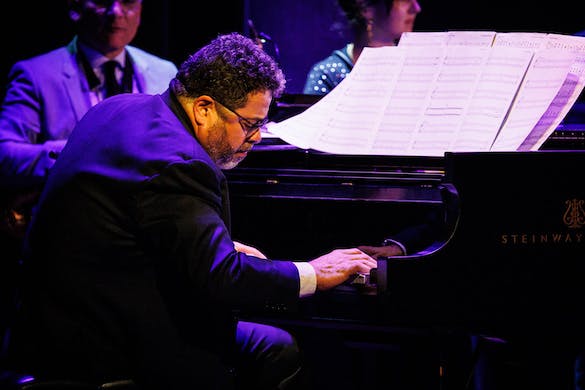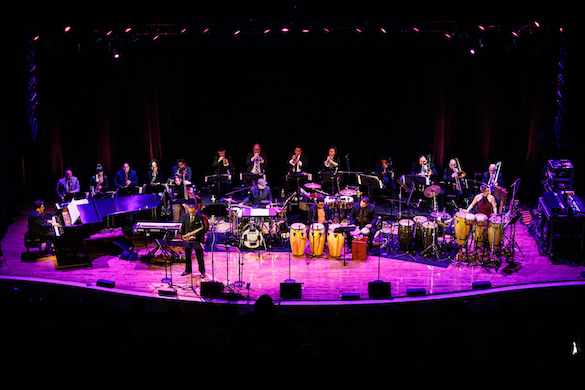Reliving a Breakthrough in the Creation of Afro Latin Jazz
An all-star tribute to the accomplishments of three remarkable creators, Dizzie Gillespie, Chano Pozo, and Chico O’Farrill, is led by O’Farrill’s pianist-composer son.

‘Dizzy, Chano, and Chico — The Original Influencers — 75 Years Later at Town Hall’
“Afro Cuban Rhythm is akin to the joy of the man who has discovered fire.” That’s a quote that has been attributed to Dizzy Gillespie, but regardless of whether he actually said it, he more than proved it.
More than any other North American, non-Hispanic musician, John Birks “Dizzy” Gillespie (1917-93), did the most to launch the genre known today as Afro Latin Jazz. One of the major breakthroughs in that moment of creation occurred at a legendary concert in December 1947, when Gillespie led his big band — joined by two all-important collaborators from Cuba, arranger-composer Chico O’Farrill (1921-2001) and percussionist Chano Pozo (1915-48) — at Town Hall.
This past Saturday, the son of one of those key participants, pianist-conductor Arturo O’Farrill, led an all-star tribute to the accomplishments of the three remarkable creators.
Born in 1960, Mr. O’Farrill spent much of his early career as an essential aide-de-camp to his legendary father. He has since become perhaps the most celebrated bandleader-conductor in the Afro Latin idiom. In contrast, his father, who was a freelance orchestrator (for Benny Goodman and Count Basie, among others), only had the opportunity to tour with his own orchestra in the final decade of his life.
Arturo O’Farrill founded the Afro Latin Jazz Orchestra in 2001-02, originally under the aegis of Jazz at Lincoln Center. In 2007, he started his own organization, the Afro Latin Jazz Alliance, and the big announcement this Saturday was that the group now plans to move into its own headquarters. Appropriately, it’s on Upper Park Avenue in Spanish Harlem.
The Saturday concert bore the title, “Dizzy, Chano, and Chico — The Original Influencers — 75 Years Later at Town Hall.” The reference to a social media catchphrase might have been a tip-off that this wasn’t a strict recreation of the music from 1947, though some original pieces were included.

75 Years Later at Town Hall,’ January 14, 2023. Sachyn Mital
The touchstones of the concert — and much of the idiom — are two milestone Latin compositions by Gillespie, “Night in Tunisia” and “Manteca,” and Chico O’Farrill’s “Afro Cuban Jazz Suite,” which famously originally featured Charlie Parker.
“Night in Tunisia” is one of those rare numbers that’s so exciting it’s usually heard as either an opener, as it was on Saturday, or a closer. Like Duke Ellington and Juan Tizol’s “Caravan,” while the title evokes the Middle East, the tune itself has become kind of a flagship for the entire Latin Jazz movement.
“Afro Cuban Jazz Suite,” first recorded in 1950, immediately followed, this time featuring a New Orleans alto sax master, Donald Harrison, and a no-less-colorful percussionist, Jacquelene Acevedo. This is a masterful piece comprising several sections, both fast and slow, and utilizing a wide range of orchestral effects.
“Manteca,” introduced by the Gillespie big band in 1947, was expanded into a 17-minute suite form with the help of O’Farrill Sr. in 1954. On Saturday, the logical choice for a soloist was Jon Faddis, a powerhouse trumpeter and the best of Dizzy’s 21st century disciples. Chico O’Farrill’s works of Afro Latin concert music are, on the whole, remarkable examples of how this music could serve for sit-down listening as well as for dancing. The influence, for instance, on Leonard Bernstein’s mambo music in “West Side Story” is obvious.
There were other highlights galore, as well as showcases for two star singers, the diminutive powerhouse Daymé Arocena and the statuesque Melvis Santa, and for Pedrito Martinez, an extravagant vocalist-percussionist-dancer-entertainer who instantly brightens every stage he is on. The three of them held forth on many numbers, and Señor Martinez opened the second act with his own six-piece group.
Mr. Harrison also soloed on a Latinate composition of his own, “Magic Touch,” but the surprise highlight of Act II was a concert work by Arturo O’Farrill titled “Corner of Malecón and Bourbon,” which the orchestra recorded on a 2014 album, “The Offense of the Drum.” The song’s title is a reference to the most famous streets in both Havana and New Orleans, and the work is comparable to Duke Ellington’s “A History of Jazz in Three Minutes.”
It starts with dissonant tonal clusters, à la postmodernist Cecil Taylor, and then proceeds to zig-zag back and forth across the various styles and eras of jazz: Donald Harrison evoked Charlie Parker’s “Mood”; baritone saxophonist Larry Bustamente summoned up the spirit of Hamiet Bluiett and the World Saxophone Quartet; and there were passages inspired by Charles Mingus as well as the pianist-bandleader himself playing stride and ragtime. Mr. O’Farrill’s two highly prodigious sons — Chico’s grandchildren — trumpeter Adam and percussionist Zak, also soloed.
This would have been a glorious finish, but the actual conclusion, “La Rumba Me Llamo Yo,” composed by Señora Arocena, was somehow even more exciting. This featured the whole company, all three singers, Messrs. Harrison and Faddis, and all three of the O’Farrills. Needless to say, the house was on our collective feet, even before Señora Arocena encouraged us to get up and move.
Whatever building the Afro Latin Jazz Alliance is going to use as a headquarters, it had better have a strong foundation and an even stronger roof if the plan is to somehow house all the energy of this music.

